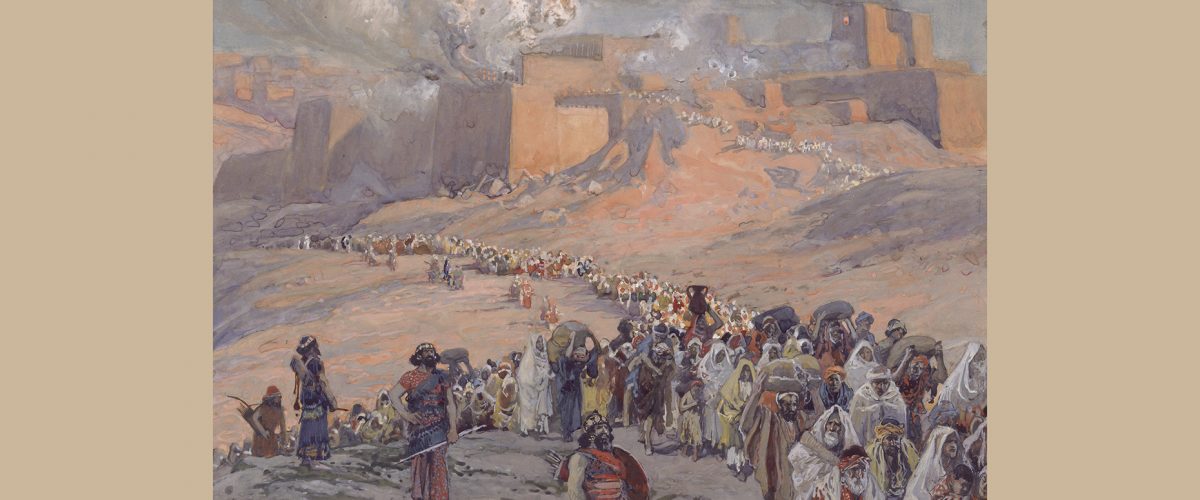Ever since the Oct. 7 attacks on Israel by Hamas terrorists, followed by the horrific obliteration bombing of Gaza in response, there is a passage from the Hebrew Bible that has echoed in my mind. It’s what I consider one of the hardest passages in the Hebrew Bible to make sense of, perhaps also the most poignant.
The passage is Psalm 137.
The psalm is set in the city of Babylon (center of modern-day Iraq) in the sixth century BCE, during the period known as the “Babylonian Captivity.” After the northern kingdom of Israel fell to Assyria in 722, many refugees headed south to Judah’s capital in Jerusalem. This led to a renewal of the Yahwistic faith, producing early versions of some of the books of the Hebrew Bible we have today.

John Carter
But in 587/586, after decades of being trampled in regional power struggles, the southern kingdom of Judah and its capital, Jerusalem, fell too. The legendary Temple of Solomon was destroyed, and the majority of Judah’s residents were either killed or taken as captives to Babylon — a distance roughly analogous to the forced march of indigenous American tribes from the southeastern U.S. to Oklahoma via the “Trail of Tears.”
Psalm 137 begins with a depiction of grief and trauma: “By the rivers of Babylon we sat and wept when we remembered Zion.” This grief, though, is met with mockery, when the Babylonians entreat the Judahite captives to sing a song of their homeland:
“There on the poplars we hung our harps, for there our captors asked us for songs, our tormentors demanded songs of joy; they said, ‘Sing us one of the songs of Zion!’”
The psalmist’s response makes clear the Judahites will not perform their grief to satisfy their tormenters, but they will not forget their homeland either:
“How can we sing the songs of the Lord while in a foreign land? If I forget you, Jerusalem, may my right hand forget its skill. May my tongue cling to the roof of my mouth if I do not remember you, if I do not consider Jerusalem my highest joy.”
The psalm then builds to a bone-chilling desire for revenge: “Daughter Babylon, doomed to destruction, happy is the one who repays you according to what you have done to us. Happy is the one who seizes your infants and dashes them against the rocks” (italics added).
Some critics of religion have cited this verse to argue the Judeo-Christian God would countenance the murder of children. Bracketing the larger question of God and depictions of violence in the Bible, I do not think that is exactly what is going on in this verse specifically.
The interpretive key for me with any Hebrew psalm or poem is its characteristic parallelism. I’m referring to the way a particular idea will be introduced in one line of a psalm and then in the next will either be reversed or intensified, or sometimes made more specific. In Psalm 137, we see this parallelism throughout. For example, the line “May my tongue cling to the roof of my mouth if I do not remember you, if I do not consider Jerusalem my highest joy” is an intensification of the ideas introduced in the previous line, “If I forget you, Jerusalem, may my right hand forget its skill.”
So what does this imply about the line, “Happy is the one who seizes your infants and dashes them against the rocks”? When we look to the line before it and see the phrase, “Happy is the one who repays you according to what you have done to us,” it suggests something similar was done to the Judahites by the Babylonians first. And historically, this would have been in line with Babylonian military barbarism.
“Read that way, Psalm 137 is not so much proscriptive as descriptive. It is not commanding revenge; it is rather depicting the common human desire for it.”
It is sometimes said that if much of the Bible is God’s word to us, the Psalms are our word to God. Read that way, Psalm 137 is not so much proscriptive as descriptive. It is not commanding revenge; it is rather depicting the common human desire for it. More horribly, it depicts the barbarism that results when one starts down a road of escalating cycles of retaliatory, or what René Girard calls “mimetic,” violence.
What brought Psalm 137 to mind for me at the beginning of October was the story that circulated soon after the initial attack (later called into question) that Israeli babies had been decapitated by Hamas assailants. Whether this particular unconscionable act occurred, it is undisputed that more than a thousand Israelis were killed. Some of these, including women and children, appear to have been burned alive. And perhaps 200 more were taken back into Gaza as hostages.
On the other side, since the start of Israel’s obliteration bombing of Gaza — justified by the Israelis as strategically necessary but denounced by international observers as disproportionate and retaliatory — more than 13,000 Gazans have been killed, including as many as 4,000 children. At least three babies died after incubators stopped working in a Gazan hospital the Israeli military intentionally attacked based on claims of an alleged Hamas “command center” in tunnels under the hospital that have yet to be verified.
This, of course, brings back memories of the “weapons of mass destruction” used to justify the U.S. invasion of Iraq — weapons we now know never existed.
“Judahite victory came through figuring out how to hold onto their memories without turning to vengeance.”
Ironically, victory for the Judahites in captivity in Babylon did not come through retaliatory vengeance against the Babylonians of the type envisioned by the psalmist. Nor did it really come from the Persians, who conquered Babylon and then allowed the Jews who wanted to to return to their homeland, starting around 538. Rather, Judahite victory came through figuring out how to hold onto their memories without turning to vengeance, a process that required the emergence of a new understanding of Jewish identity based on ritualized memory, allowing them to hold on long enough to return home.
Speaking of the Oct. 7 attacks and their aftermath, Israeli writer Gershon Baskin has said, “For Israel, this is the biggest trauma that we’ve faced since the Holocaust, and without making comparisons, for the Palestinians this is their biggest trauma they’ve faced since the Nakba. … We have to begin to look forward. This is a new narrative, this is a new chapter in our collective memories that we will never forget. But if we don’t look forward and accept the basic principle that there are 7 million people who are Israeli Jews here and 7 million people who are Palestinian Arabs who are living on the same land, that they (both) claim as their homeland, and we don’t recognize that everyone who’s living here has the same right to the same rights, then we will just continue doing this for another hundred years as we’ve been doing it. This has to be the game-changer.”
The desire for retaliation when one has suffered unspeakable trauma is understandable, even to the point of wishing ever worse on the one who caused it, but it is a fool’s errand, never leading to the satisfaction it promises. For God’s sake, the deaths of the children who have already died, on both sides, is tragedy enough.
John Carter serves as visiting assistant professor of law at the Wake Forest University School of Law and in the Program for Leadership and Character and as visiting assistant professor of religion, law and public life at Wake Forest University School of Divinity.


